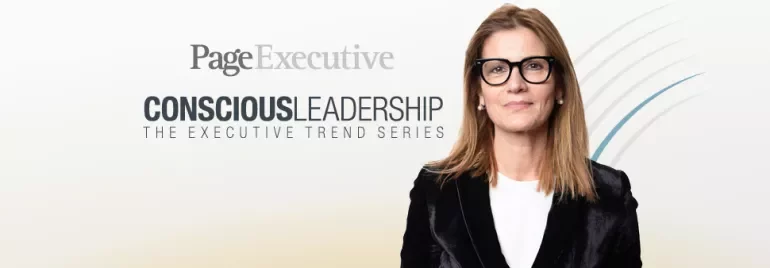Looking to hire your next leader?
Get in touch with one of our consultants now to discuss your leadership talent requirements.


![]()
Imagine being part of a team that rolls out a successful vaccine. You'd go to bed each night knowing your work might have saved countless lives. In HLS, every day is a chance to bring health and hope to people worldwide. But, as compelling as this field is, finding the right talent for HLS is increasingly tough.
More than 70% of companies in this sector are ramping up their workforce but face high turnover. A skills gap is emerging as technologies like genomics and artificial intelligence (AI) become crucial in healthcare. Plus, there's a real need for more diversity at the top -— right now, only 17% of CEOs in biopharma are women, and only 13% are from underrepresented groups.
We're at a turning point, in need of conscious leaders — people who understand the industry's technical complexities and deeply connect with its mission.
But what do we mean when talking about conscious leaders?
To provide value to our clients, we need to be able to unpack what this means and how it solves some of the challenges the HLS industry is facing. Here are what I regard as the three pillars of conscious leadership.
Aligning a leader's values with the company's vision isn't just important — it's everything. It's not about searching for "yes-men" or "yes-women" who just echo what a company stands for. Instead, it's about identifying those rare leaders who genuinely connect with a company's core values and bring their unique insights to spark innovation and growth. When a leader's values mirror the organisation's culture, they don't just blend in – they become a driving force for meaningful progress.
Emotional intelligence (EI) isn't just about reading the room. It's about leading teams with impact and empathy. The author Daniel Goleman identifies five EI competencies crucial for leaders:
Getting to the heart of what motivates a candidate can be the most revealing part of recruiting. What's really driving them right now in their career and life? Are they fuelled by the thrill of tackling new challenges, the urge to innovate or a deep-rooted desire to make a real difference in the world? From my experience, when a leader’s drive mirrors the organisation's objectives, the possibilities for meaningful change are extraordinary.
So how do you find HLS talent that embodies these three pillars of conscious leadership? Let's break down a few practical strategies.
Conducting in-depth interviews: Engage in thorough, open-ended interviews with both clients and candidates. For example, when working with a biotech firm, ask about their long-term vision in areas like drug development and explore the challenges they’re facing, such as navigating regulatory regimes in new markets.
Keeping everyone in the loop: Maintain regular check-ins throughout the recruitment process to build trust. This could involve weekly sit-downs to chat about how things are evolving and what feedback you're getting from candidates.
Casting a wider net: Actively seek candidates from diverse backgrounds and sectors. For instance, consider a candidate from a tech background, if and where possible, for a senior role in a pharmaceutical company to bring fresh perspectives.
Inclusion training for recruiters: Implement regular inclusion training for your recruitment team, ensuring they understand the critical role of diversity in driving innovation and patient-centric solutions in HLS.
Behavioural assessments: Use tools like psychometric testing to assess a candidate's leadership style and adaptability. At Page Executive, we have a specialised senior team focused on executive assessments. Our approach extends beyond merely administering tests. We delve deeper, utilizing motivational interviews to uncover specific behaviours and motivations of candidates. This method allows us to determine their alignment with the company's values and assess whether the company can fulfil their expectations. For example, how would a candidate for a top role in a medical device company lead a team through a technology shift?
Real-world scenarios: Throw hypothetical but relevant curveballs at candidates and see how they respond. For instance, how would they lead a team through a regulatory hurdle or a product launch?
Deep-dive interviews: Ask candidates about career highlights and what they found fulfilling in those roles. If someone's been a champion for patient rights in the past, that's a bright green flag for a patient-first company.
Career mapping: Chat about where candidates see their careers going. This can help figure out if they're in for a quick sprint or a marathon with the organisation.
Getting everyone's take: When looking for someone like a lab director, ask around — R&D, operations, even marketing — to get a 360-degree view of how this person might fit into the bigger picture.
Customised assessment criteria: Create criteria that weigh up both the hard skills and the softer, human side of leadership. For example, for a clinical trial manager position, weigh candidates' project management skills alongside their ability to inspire and rally a diverse team.
The only way to find conscious leaders is through conscious recruitment. At Page Executive, we're on the lookout for those special individuals who can drive an HLS company forward, not only with their knowledge and experience but also with their vision and values. It's not enough to find a good fit for the role. We want to find leaders who will be catalysts for transformation and growth.
In a recent project with an international rare disease company, we faced the challenge of finding exactly those sorts of leaders. This company, operating in a highly specialised market, was undergoing a significant transformation, focusing on new therapeutic areas in rare diseases.
The plan was ambitious: to revamp four out of seven positions on their leadership team. For a company in the rare disease sector, where teams are typically lean, this was no small feat. Our goal extended beyond just finding candidates with the right technical know-how; it was about piecing together a team ready to embrace change and make a meaningful impact in the rare disease space.
Our search included roles like the Medical Director, the head of a business unit covering two therapeutic areas and a community engagement and communication head. The latter was particularly crucial, as it involved bridging the gap between the company and patient communities, requiring skills in both internal and external communication, as well as patient advocacy.
The toughest part? Assessing candidates not just on their technical abilities but on their behaviour, leadership style and how they fit into the broader system. This involved a deep dive into their past professional and personal experiences, leadership track record and ability to adapt to market changes.
As we wrapped up the project, the feedback was overwhelmingly positive. We not only filled the positions but also helped the company reshape its leadership team in a way that mirrored its values and mission.
The HLS sector is at a crossroads, with rapid technological advancements and a growing focus on personalised healthcare. Leaders in this space must embrace new paradigms, from patient-centred care models to integrating AI and digital tools in healthcare delivery. It's about leading the charge in transformation, not just keeping pace.
With our deep industry expertise and tailored approach, Page Executive is uniquely positioned to meet these recruitment challenges. Drop us a line, and let's work together to identify and nurture the next generation of HLS leaders.
> Contact Simonetta Saprio
> Discover more about Healthcare & Life Sciences at Page Executive
> Explore more of our Conscious Leadership series
Get in touch with one of our consultants now to discuss your leadership talent requirements.

Choose your country from the list below to complete the brief form:


